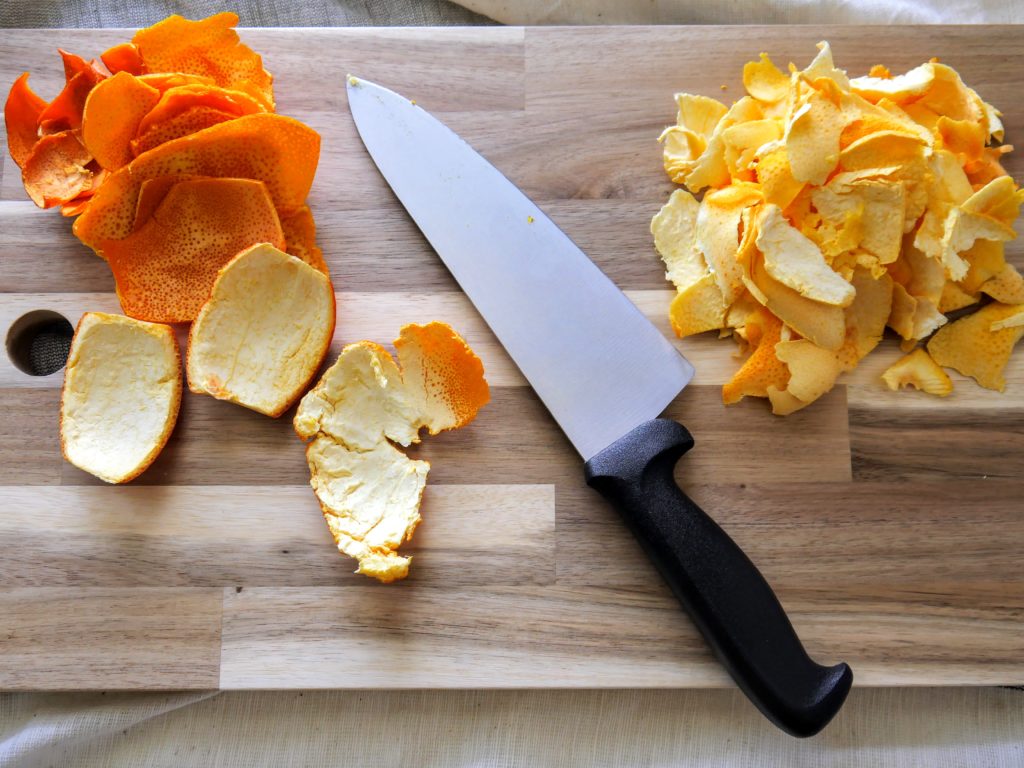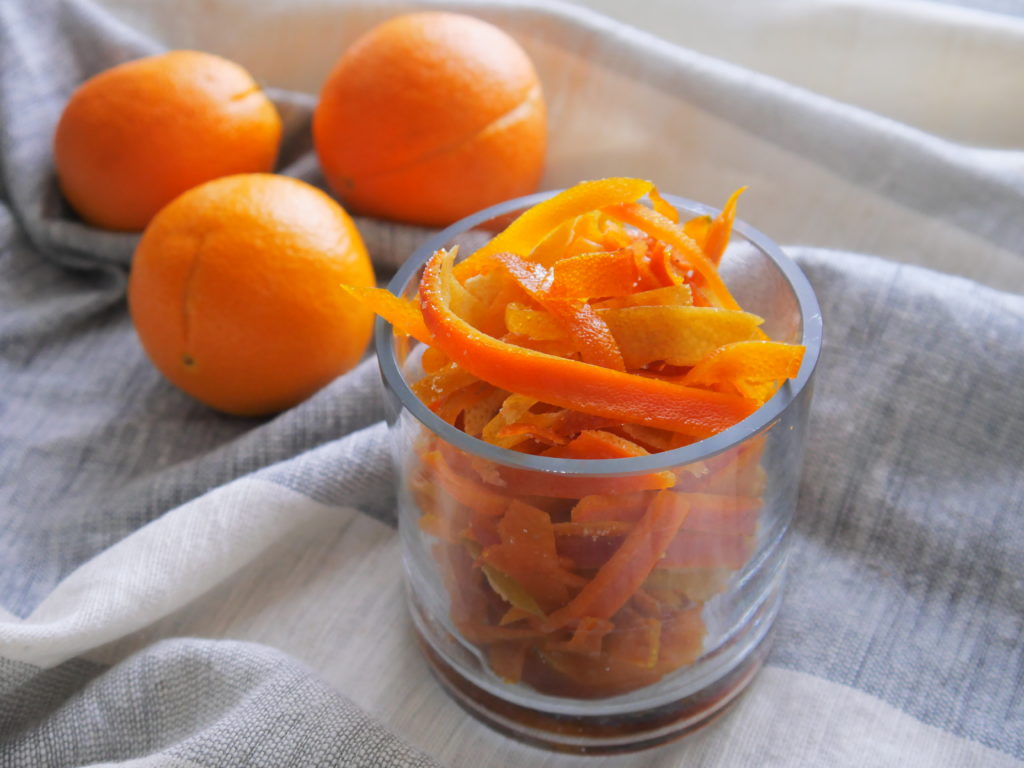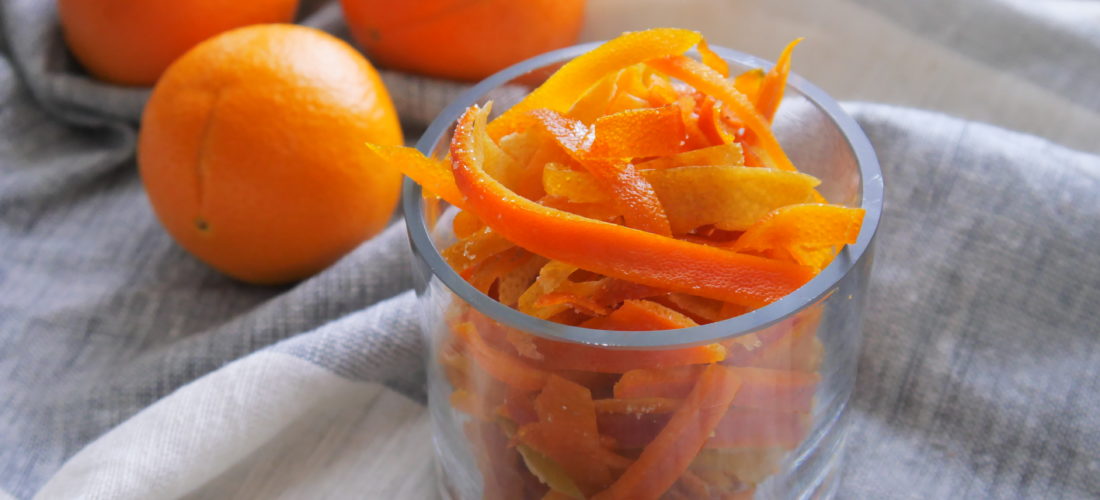
I try to eat only what’s in season, but occasionally find myself undone by beautiful produce. This has happened not once, but twice, in recent weeks. The first time, I was undone by a cardboard box heaped with mandarins, their still-attached stems and leaves an tantalizingly glossy green; the second time, by a pyramid of plump cara cara oranges. In both cases, I was powerless to resist and subsequently glad that I didn’t—seasonality be darned, those citrus fruits were outstanding; juicy and succulent with the perfect amount of tang.
But each time I peeled a fruit and went to pitch the rind into the bin, I hesitated. Really, it was guilt—it seemed like one type of environmental sin to buy fruit out of season, and another one to chuck part of it away, and my conscience simply couldn’t take it. So I saved the peels, letting them accumulate in my refrigerator while I decided what to do with them. The idea, when it came, felt a little bit audacious and a little bit obvious: why not candy the peels? I spend weeks searching for candied peel every Christmas to make fruitcake, and perhaps that annual scavenger hunt made me think that candied peel would be difficult to make. But no! Like many of the other things I like to make from scratch (bread, granola, pesto), all it takes to make candied peel is a bit of time.
Some recipes call for you to cut up your preferred citrus fruit—clementines, grapefruits, lemons, oranges—in order to harvest their peels. This is certainly an option, but I opted to save the peels from our regular consumption over the course of a week or two, collecting them in a covered dish in the fridge. A few might dry out a bit, but in my experience they don’t spoil quickly. When you’ve accumulated a fair number, let your preference for bitterness and your available time guide your next steps. If you don’t like bitter things, cut away with the pith; if you’re low on time or your pith-peeling skills need work, skip it. Blanch the peels at least twice—more if you don’t like bitterness—then boil them in a sugar syrup. Strain off and reserve the syrup for cocktails, let the peel dry a bit, then bake with it, freeze it, or eat it as we do, straight out of the jar. I think it tastes delicious, but maybe that’s just the imagined flavor of absolution for eating out-of-season fruit.

Candied Citrus Peel
Sources: I Thought There Would Be Free Food
Makes as much as you like
Active time: ~ 1 hour; total time: ~4 hours
Ingredients:
- Accumulated citrus peels, any variety—I’ve used clementines, grapefruit, mandarins, and several varieties of oranges
- Water
- White sugar
Directions:
- If you want your citrus peels to be less bitter, use a very sharp knife to carefully cut away and discard as much of the white pith as possible without slicing into the peel.
- Slice the peel into your desired width; the ones in the photo above are about 1/4-inch wide, but I’ve also done them thicker or thinner—it’s your choice.
- Put the sliced peel into a heavy-bottomed saucepan and add just enough water to cover. Set the pot on the stove over medium-high heat and bring to a vigorous boil, then drain. (You can keep this citrus-flavored water to make tea with, if desired). Repeat the blanching and draining process once more.
- Use a kitchen scale to weigh the amount of peel you have. Add it back to your saucepan along with the same weight of sugar and water. For example, if you have 300 grams of orange peels, combine them with 300 grams of white sugar and 300 grams of water.
- Set the saucepan over medium heat. Let it come to a boil, and then reduce the heat to low and simmer the peel until it is soft—it shouldn’t be mushy, but still have a bit of toothsomeness—and nearly translucent.
- Drain the syrup from the peel, reserving the syrup for later use (recipe coming next week). Set the peel on a wire rack to dry until it is just tacky, which may take several hours.
- At this point you can toss the citrus peel with additional white sugar. If the peel isn’t dry enough, the sugar will absorb into it; if it’s too dry, the sugar won’t stick. It’s a fine balance.
- Whether you sugar the peel a second time or not, I prefer to store my citrus peel in a glass jar in the refrigerator. It also freezes well for several months.
